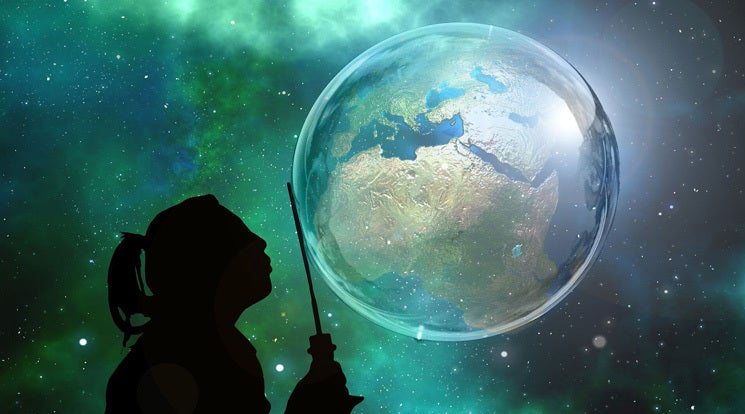Envisioning global learning futures

Imagine a future where creating knowledge is driven by collaboration not competition. Where research is shared and not selfishly coveted and where the good of the community is of equal or greater value than the accomplishments of the individual.
These were some of the ideals envisioned during a provocative roundtable conversation that coincided with the release of the report, “Reimagining Our Futures Together: A New Social Contract for Education.” The report was commissioned by UNESCO — the United Nations Educational, Scientific and Cultural Organization — and created by the agency’s Futures of Education Initiative. The talk was part of a webinar focused on the learning futures hosted by Mary Lou Fulton Teachers College at Arizona State University in February. More than 150 people attended from 13 countries including Saudi Arabia, Kuwait, Kenya, Brazil, Ireland, India, France and Belgium.
The event provided an opportunity to learn about the report and contemplate “things we need to move forward on and things we need to address — the grand challenges of education -— in a much more future forward direction,” said Carole Basile, dean of MLFTC.
“It is really very, very critical right now. This is not the time to be thinking about research as a solo researcher,” continued Basile. “This is a time to really think about how we work together, how we collaborate, how we use our interdisciplinary knowledge to create new things and new ways of thinking as we move further. The UNESCO report gives us a path for that.”
Report gives voice to millions
The panel, "How Can Research Contribute to Shaping Global Learning Futures," was part of MLFTC’s larger initiative, Learning Futures Collaboratives, which addresses complex challenges facing education today and into the future, explained Iveta Silova, professor and associate dean of global engagement at MLFTC and organizer of the event.
“UNESCO has catalyzed a really impressive global debate on how education, learning and knowledge need to be reimagined in a world of increasing complexity, uncertainty and fragility,” Silova said.
Nearly two million people contributed to the report over a 2-year period — a process that in many ways mirrors some of the messages it carries. The report was created as a result of extensive collaboration and its essence is the critical necessity for collaboration of ideas, knowledge and research
The webinar featured panelists: Peter DeSouza, professor for the Centre for the Study of Developing Societies in New Delhi, India, Inés Dussel, professor and researcher for the Department of Educational Research CINVESTAV Mexico City, David Edwards, secretary general for Education International and Noah Sobe, senior project officer of UNESCO. Each participated in the creation of the report in different ways. The webinar was facilitated by Silova.
Edwards noted the contrast between this report and the barrage of “fatigue-inducing” commissions in the field.
“What I like about the report is that it doesn’t start with a blueprint, to do this or that,” he said. “It starts with an invitation based on principles and based on a vision — what is the world we want?”
Villains and heroes play roles in the report
Participants were asked to imagine the report as a movie and identify both its heroes and its villains.
One of the threads running through the conversation was the necessity for something most learned in kindergarten — sharing. Panelists discussed sharing versus competitiveness and covetousness — and the value of shared knowledge, shared research, shared ideas and solidarity as opposed to limiting knowledge through nationalism, privatization and individualism.
Edwards celebrated the idea of the “pedagogy of solidarity” as a hero of the report. Private market people are always looking at the individual return on an action. “We are trying to explain — no, it's a collective return.”
According to Dussel, the report emphasized the importance of “working together in a really polarized world in which people don’t want to talk to each other.” Dussel denounced the problem of “proprietary knowledge” in research that is related to corporations. “They are not thinking about the common good necessarily.”
DeSouza discussed nationalism, nationalist objectives and the world of “knowledge enclosure movements,” which he regards as villains that are “very damaging to the growth of knowledge.''
He cited the creation of the COVID-19 vaccine as an example of this.
When Pfizer and BioNTech teamed up to create the vaccine they “got a huge amount of public funding ($2 billion for 600 million doses) and yet the data for the vaccine remains private and there is huge resistance to making the technology available to large parts of the world,'' DeSouza explained. “Even if (it means) millions of people get the virus.”
DeSouza believes nationalism impacts what is and isn't being taught in the U.S. and around the world.
“Nationalism is not a friend of education,” he said. “It wants to use education for political purposes.
Sobe agreed.
“For the most part all we do is measure and value individual accomplishment,” explained the senior project officer of UNESCO. “What a huge wasted opportunity right? When we think about the challenges in front of us, we definitely need to get better at working together. I think that is a clear hero.”
Faculty, researchers and students from the MLFTC community also responded to UNESCO’s report, reflecting on the future of their specific area of research. Organizers believe that the report and the roundtable will inspire a much-needed global discussion on the future world of education.
“To capture the momentum we would like to connect the vibrant conversations on learning futures at Arizona State University to the global debates,” said Silova. “The UNESCO report presents a unique opportunity to do so.”
Read responses to the UNESCO report.